Rose Griffin is a speech-language pathologist and behavior analyst who’s created an online business that helps autistic kids find their voice, ABA Speech. She’s also an SPI Pro member and social media expert who loves helping other entrepreneurs make the most of platforms like Instagram and TikTok.
I talked to her about the launch and growth of her business, monetizing her podcast, her evergreen course strategy, and making the move to full-time entrepreneurship.
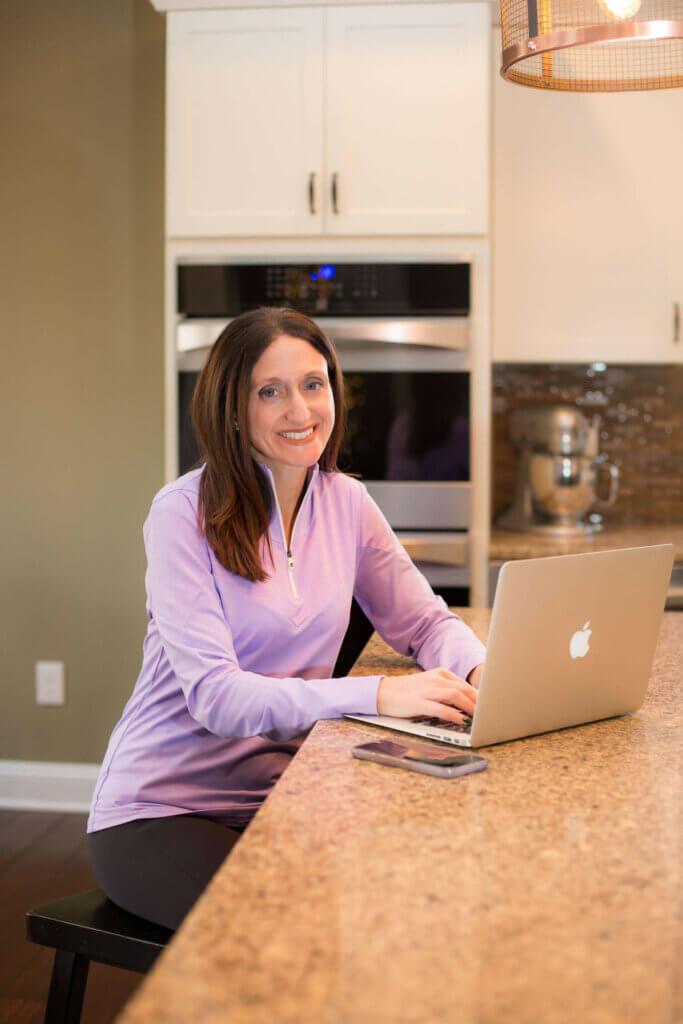
Ray Sylvester: Our readers might be familiar with your story from your recent podcast episodes [AskPat 1187, AskPat 1195, and SPI 574). I’d love to learn more about the evolution of your business and what you’ve got planned for it. You’ve been running ABA Speech for about four years. What were you doing before that?
Rose Griffin: So three days a week, I’m a school-based speech and language pathologist—speech therapist. I’ve done that for 20 years, but I’m actually stepping away from the public schools in five days. So a huge transition. My business has just grown so much that I feel like when I go in [to school], it’s taking me away from my business, plus I do have three kids. I just want to be more present, and growing this business has really allowed me to have that flexibility, which I never ever thought I would do when I first started it. So that’s kind of scary, but it’s very exciting.
I feel like the sky’s the limit. And I try to be really optimistic, so I’m just excited to be able to scale my business. I continue to work as a speech therapist. I also have this other certification called BCBA, which stands for Board Certified Behavior Analyst. And there’s only 500 people worldwide that are both speech therapists and BCBAs. So I have based my business on this very niche thing that I do, which is helping autistic learners who are not yet speaking start to communicate.
Ray: Well, congratulations first on the big leap you’re about to make. That’s really exciting. Three days in school and the rest working on your business—has that been your arrangement for a while?
Rose: Yeah. The year I started ABA Speech, I was working one day a week at a clinic. And then I just started to get so busy that for the past four years, I’ve just been doing three days in the school. But then in COVID in 2020 is when my business really started to become a business. I’ve been profitable for not the first year, but every year after that. And then during COVID, everything kind of exploded. People were buying my products and wanted my courses, and things really changed for me in 2020. So it’s continued to grow.
Ray: How did you get started?
Rose: I had this idea for a product called the Action Builder Cards. I had people in my clinics. I was saying, okay, let’s work on this specific label for this kid. And so people were making a lot of color copies, Google images, and just spending a lot of time, probably a lot of money on color copies. And I didn’t see anything like that in the marketplace. And I was like, oh my gosh, I wanna create this. It was just random, but I think I put something on Facebook and my neighbor was like, “Oh, I know a designer.” So I started working with her, and then I just called different places that could print the product.
And I mean, that was the whole thing. It was really from this product. And then it came, and I was like, wow, this is exciting. I remember me and my husband purchased them from the printer, and it was $6,000. I’m like, Oh my gosh, what am I doing? But I just had this little vision. That was almost five years ago. And then I was like, oh dear, I need a website. And I’ve been presenting for probably 10 years in the field, but I started presenting more. And then it just snowballed. A year later I started the blog, and then a year and a half ago I started the podcast, a weekly podcast called Autism Outreach.
It just kind of snowballs. You see what people need, and you start creating. And then Instagram and social media has really been a big part of that, how I’ve grown in my business.
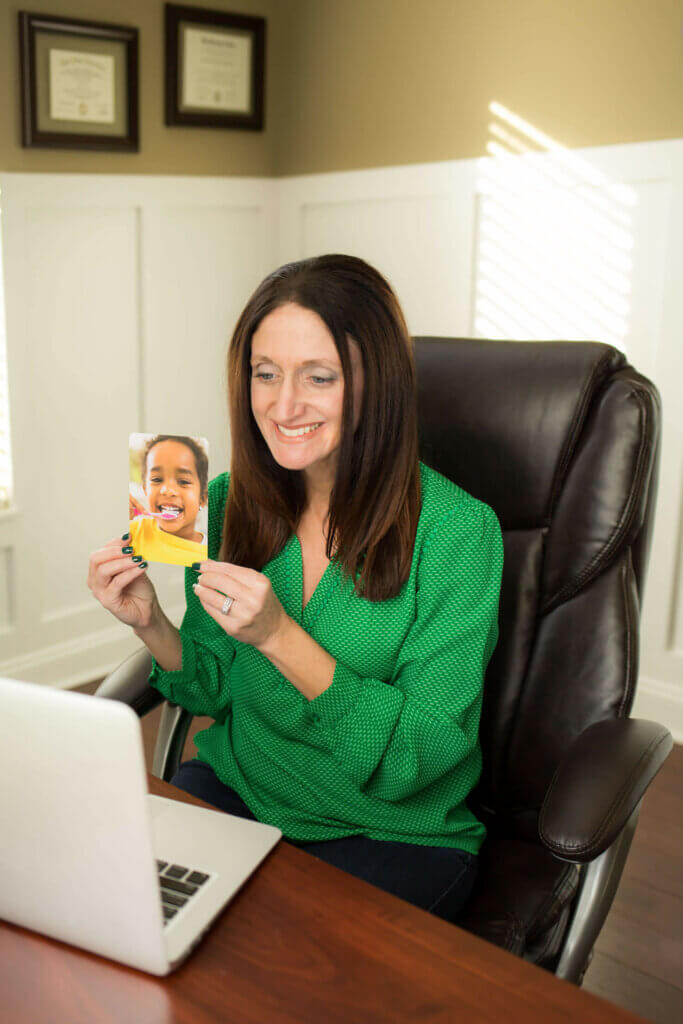
Ray: What was your first sale of the product? Did you already have a customer in mind?
Rose: I was talking to different distributors in the educational space. So even before I had got it printed, I had a couple verbal promises: “Hey, yeah, we’d love to sell that.” Looking back, I’m like, wow, that was really brave of me to try to contact these large companies. But the lady who owns Different Roads to Learning, which was one of my first distributors, her daughter is autistic. So it’s kind of a tight-knit community. People know that I’m in a helping profession. So I think she took me under her wing a little bit. And that was probably my first distributor.
Then I started a Wix website. I live in this big development. And a fellow small business owner in my development came over. I was really stuck on putting together my website where people could purchase this product, and she helped me tweak it. So just kind of organically from there, that’s how it all started.
Ray: After that first deal, you started building the website. Did you get more customers through word of mouth, or did you have a funnel set up on your website? Did you get on Instagram right away?
Rose: Oh yeah. And the other thing I wanted to share is, right before I started my business, I had a really horrendous Kickstarter campaign. I didn’t really know much about Kickstarter. I made a video, and it was so bad. I didn’t have a ring light; it was like side lighting. It was just me talking to the computer. It’s like when Pat shares that first podcast episode and he is so timid? It was totally like that. And obviously, my Kickstarter didn’t <laughs> get funded because I didn’t know what the hell I was doing.
And I remember this guy reached out to me. His wife is a speech therapist, and they had a funded Kickstarter at the time. He wrote me the nicest supportive email. It was exactly what I needed. Because I felt defeated. I think one of my best friends from high school donated, and that was it. But I had no following at the time. I didn’t realize Kickstarter’s like being on Shark Tank. It doesn’t matter if it gets funded; it’s a marketing ploy.
So that was nice. And then I would see that guy and his wife at trade shows and it was just really nice that he reached out to me during that time because I needed that supportive email.
Ray: This was before you’d even got that first deal with the distributor?
Rose: Yeah, pretty much when I had the idea for everything.
Ray: So the Kickstarter was like, “This is how I’m gonna get this moving!”
Rose: <laughs> “This is how I’m gonna do it.” Yeah. That was the plan.
So we came up with this product—action builder cards—and then I had a website and I started to sell those. Then I started to get invited to speak in my niche area, at the biggest speaking events that were all virtual at the time. SLP Summit—thousands of speech therapists attend these. That was really great. I then started to write for ASHA, the American Speech-Language-Hearing Association. I just contacted them, and had an idea for an article. I was a writer in that publication, which was big for me. And then I went to the ASHA conference, which is our largest conference for speech therapists. I had a one-year-old and two other kids at home. It was in LA, of course. It was like the farthest point from Ohio <laughs>.
So I presented, I got to meet everybody, networked. I was like, what am I doing here? But it was great because I made some really good connections. And then my business just kind of grew. I also have a Teachers Pay Teachers store, where I sell digital products. So that continued to grow my business.
I just want to be more present, and growing this business has really allowed me to have that flexibility. It’s kind of scary, but it’s very exciting.
Rose Griffin
Then I came out with another physical product called Double Up, which is for older learners. Then I came out with the blog. And then I started something that’s really been a revenue generator for me: my company offers continuing education courses for people that are speech therapists and BCBAs.
And so I started offering larger courses. This is why I got into one of the AskPats because when I first started my big course called Help Me Find My Voice, I offered the course and sent you a set of action builder cards, and I only charged $99. I have a friend in the online space who’s a multimillionaire, and she was like, “You really should not be charging that.” But I was like, “No one knows who I am. Why would anybody buy this?” So that helped to grow my audience. Because it’s like I was giving it away. And so those courses became popular.
Rose joined Pat twice in 2021 on AskPat 2.0, first to get help with her course pricing and then to see how things were going:
I continued to grow my social media, my Instagram, and continued to grow my email list. And I was doing tons of podcast guest spots, and I was like, gosh, I need to just start my own podcast. So I took Power-Up Podcasting almost two years ago, and I’ve had my podcast for a year and a half. It comes out every single week, and that’s just been amazing for the connections I’ve made, and it has led to other speaking gigs. Now I do a lot more trainings in my space, for other companies. And all of those things have really helped me to get my business to where it is now to where I’m able to say, you know, I can’t go into work three days a week because it’s taking away from all the people that I can serve in my business now.
Ray: That’s quite a list of things you’ve accomplished so far. Have you done all this as a solopreneur, or have you worked with VAs or a team?
Rose: Yeah, I definitely have help. When I started the podcast, I was like, I know I won’t be able to do all that myself. So I have a podcast manager. I have a virtual assistant. I have a social media manager. I come up with all the content because I actually like social media, but they post it all for me, and they write the copy, and stuff like that. I have a ghost blog writer. I have a graphic designer. I have a tech team. And most recently, something that I did this past year that was really an investment, but it has been really exciting, is I started working with a StoryBrand copywriter who’s been on Donald Miller’s podcast. And a website developer who Donald Miller uses as a case study.
Ray: Early on, were there points where you tried you bit off more than you could chew and realized you needed more help? Or did you know from the beginning that you couldn’t do it all alone?
Rose: No, I’ve always known from the beginning. I think it’s just because I have three kids and a family, and I’m not the best at everything. I read Virtual Freedom, which was a really good book about having assistance. And I listened to this lady’s podcast, the Not So Wimpy Entrepreneur. She’s a multimillionaire with five kids, and she only works 20 hours a week. And I find everything about that very inspiring. <laughs>
I mean, sometimes I’m checking my email on the weekends, but I try to be really present. And I think a strength of mine is—it sounds boring—but coming up with standard operating procedures and training people. When I started, I did myself, I did every single thing myself, but you know, as my business grew, it was stressful to know I needed to train this person the right way. But you have people that switch and change and leave. Because they have to take a full-time job or, you know, things happen. And so when that happens in my business, I don’t freak out as bad.
Ray: Did you have moments where someone you’d hired moved on to other pastures and you had to recalibrate?
Rose: Yeah. Recently, I had somebody who was helping me with my continuing education. I have to send it into reporting. It’s very intense and very specific. And I had to train somebody, and it’s just so not what I wanted to do with my time anymore. I always did it, and I trained somebody else. They did it for six months, and then they had a major life emergency and they were like, “I can’t do this anymore.” And I was like, that’s fine. I’m still friends with this person. They help out now in a different way. But that’s such an important piece of why I make money in my business; it’s so very important. So I had to train somebody else on my team who I really trust to do that. And they’ve been doing it almost a year, so it’s been good.
Ray: Got it. And how big is your team now?
Rose: I probably have eight to 10 people that are doing things for my business on an independent contractor basis.
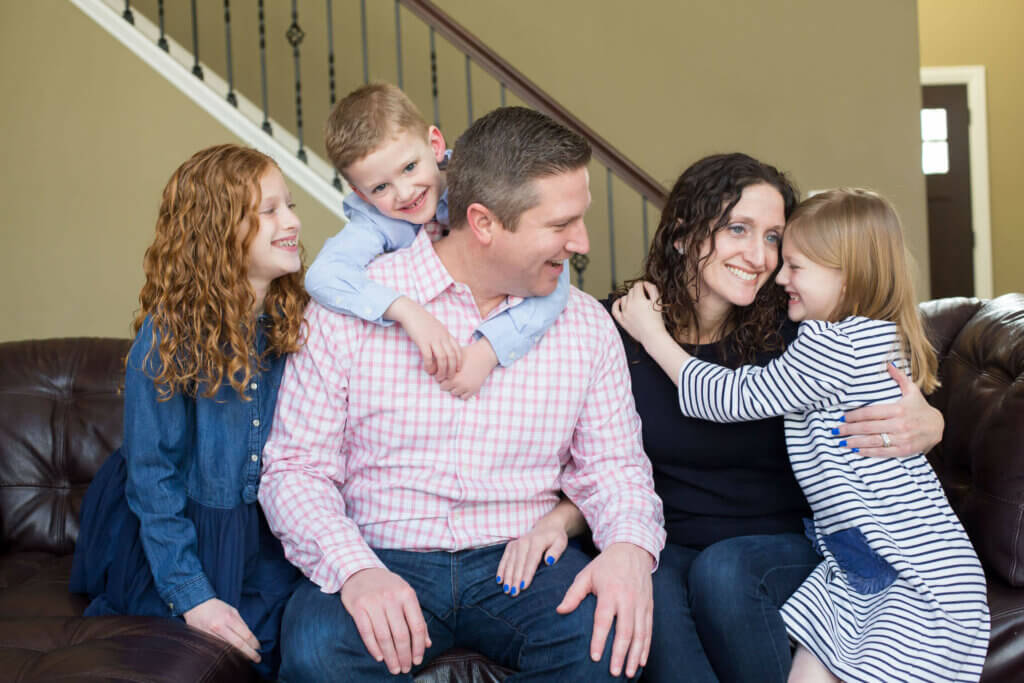
Ray: I’d love to hear a little bit more about your course pricing strategy. Obviously, you worked on that with Pat a little bit, and you got a nudge from at least one other person to raise the price. But you also said that the courses helped you build your audience and get people through the door at that price point?
Rose: Yeah. I mean, that’s what I feel. You know, I have people now that will join my live webinars and I’ll be like, “Oh my gosh, I remember your name,” because I did all the reporting myself. I know I sent your action builder cards myself <laughs>. I mean, at the beginning that seemed right. And then, you know, I joined a business mastermind before SPI Pro started. I had to take Amy Porterfield’s course, DCA. And so I made some friends from that and had a mastermind, and none of them in education, you know, so they’re like, “Oh, Rose, you gotta charge more for your course.”
And so I think it was last summer, I changed it to $297. That felt scary, but I think it was the right move. And last week, somebody in my former district down in Texas purchased 44 sets of action builder cards. And on that same day, somebody purchased one of my evergreen courses and I was like, oh my gosh, for my little company, that’s almost $3,000. So that just made me feel really good. <laughs>
Ray: That’s great. So how many different products and offerings did you raise your prices on?
Rose: So across the board, I have two signature courses, and they’re each $297. One is for working with school-age students, and one is for younger students.
Ray: Tell me a little more about the impact of that price change. Are you selling more courses at that price point?
Rose: Yeah, I’m definitely selling courses every month. My courses are on evergreen, so that’s a whole other thing. I’m in an evergreen mastermind where I’m analyzing all of that because I’m not using paid ads for that. It’s all organic. This September, I’m going to launch another large course. And so I’m still thinking about how to price it. I might just price it at $197 for this, like when it first launches and then when it goes into evergreen, put it at $297. That’s kinda my thought.
But I have seen with every launch that I do, I’m making more and more money. So once a year, I’ll do a big launch of a big course that’s new. And I think over time, although now things are so different. I used to use Facebook ads to fill my webinars, but now I have so many people that get on my waiting list. When I launched my younger course in September, I had made so much money already from my business by the time I actually launched with live webinars that I was feeling really good about things. I wasn’t stressed and, you know, all that stuff. It felt good. I feel like as my list grows, as people get on the waitlist, as I give those people access earlier, that each launch hopefully will continue to grow.
Ray: What led to the decision to make the courses evergreen versus opening and closing them?
Rose: Yeah, I think I talked to Pat about this a little bit. It’s just kind of the nature of what I do. I feel like ethically, they should be evergreen. So the courses are all about how to help kids who are autistic start communicating, and they’re for parents but mostly professionals. What I did this time is I launched my course in September and then I closed it. And I was like, “I need to take care of everybody that purchased.” I think I had almost 200 people that purchased in the fall, so that was exciting. And then I made an announcement like, “It’s ready to go. You can take it when you want.”
And then twice a year we’re doing a sale, and that has been helpful. Last December, I made close to $5,000, which was good for my business. Just by sending some emails, and not doing all the Instagram lives <laughs> and all the stuff that you’re “supposed” to do, which is extremely emotionally draining. Yeah.
Ray: For that course launch, you said you got about 200 people and then closed it temporarily to get your ducks in a row. Is that something you’ve done for all of your courses, or was that a special thing because you had so many people?
Rose: It was something new. And I feel like I did want people to have some kind of deadline. I guess that’s just kind of hard about my courses. I’m gonna have diehards that find my website and wanna buy my course and my products and all the things, or people that will buy when it’s on sale. Obviously, it’s harder to get those sales when I’m not launching. I feel like people have to have a deadline. So in my mind, for my courses, I’m like, okay, when I do a launch projection, I’m gonna make X amount of money, and then I’m gonna close it to make sure everything’s working and everybody’s happy with the content. And then I’m gonna open up again and let people know that it’s available forever green because I feel like ethically, it just needs to be open.
Ray: But that’s something you’re planning on doing for all of your future courses?
Rose: I am. Yeah. That seems to work really well. I guess it’s kind of a scarcity mindset, where I feel like people do need that. And I need help with my evergreen. I have emails that go out, but I’m not discounting the price at all or anything. I’m just directing all my marketing to those two big offers.
Ray: You’ve mentioned your email list a couple of times. How important has email marketing been for the growth of the business?
Rose: Oh my gosh. I mean, it’s everything, I feel like. In the beginning, I had a lot of content, different content upgrades. I have one freebie download that has probably got about 11,000 people on my email list. So just kind of leaning into that, and that’s been huge. So now I do a broadcast every week, but I’ve always heard Pat talk about, you know, you have to segment your list, and it’s so important, and I’ve been working on that. And so now I have actually worked with somebody in SPI Pro, Brad Hussey. He actually did a Teaching Friday too. He went into my ConvertKit, and he’s just so smart.
He showed me these visual automations and I was like, “Oh my God, how do you know how to do all this?” So that’s been an absolute game-changer for me because now people can click on my website and my Instagram and my podcast, which are my biggest things. And then we have segmented people into three different funnels, and those three funnels each have their own evergreen email sequences. I’ve seen my click rates really increase. And I know that if I email something to my list, I mean, I can definitely put it on Instagram and TikTok and all the things. But when I talk to my email list, that’s how I’m gonna make money is through my email list. And so just nurturing those relationships. And working with Brad, that was really a game-changer for my whole email. It just tightened everything up.
In SPI 574, Rose shares a few simple but powerful steps and strategies you can use to start creating great TikTok content that helps grow your audience and your business:
Ray: So you’ve got the website, Instagram, the podcast, email, TikTok. Do you foresee any of those becoming more or less important? And what else do you have in store now that you’re going to be focusing more time on your business?
Rose: Yeah. I just listened to this Creative Elements podcast episode with Jay Clouse and Nathan Barry from ConvertKit. And I loved it because I feel like when I started my business, they said, “Is your business more of a strip mall where you have all these different things, or is it more of a skyscraper?” And I really love that, because even with the StoryBrand, I’m really just leaning into what’s making the most impact and what is generating the most revenue for my business, which is presenting and training in my courses. And so I plan to have more offerings like that. I think I’m gonna work with Mike Pacchione, because he does this group coaching, and I really would love to.
I get a lot of feedback about my presentations that they’re helpful and things like that. But I would really love to inspire people just with what I’ve been doing in my life, because being a speech therapist or having an autistic child can be really overwhelming. So, if I can hone my craft a little bit to help people feel inspired, that would really be great for me because I would love to do more of that. So that’s really my goal, is to do more of that. I love my podcast. I’ve monetized that. I think those are the two biggest things that I’m gonna focus on.
Ray: How have you monetized your show? With podcast ads?
Rose: I do some of that, but this has been amazing: I had a company that I’ve done webinars for the past 10 years, once a year every other year. And when my podcast came out, they reached out to me and they were like, “Wow, your podcast sounds so amazing. Can we purchase 10 of your episodes?” That was something both Pat in his office hours and my business mastermind were like, “Okay, you’ve gotta charge X amount of money for this.” And it was a lot of money. They did that deal last year, and they wanted to do that deal again.
And I do podcast partnerships because I’m not getting millions of downloads. I’m leveraging my social media, and the way we’ve been getting people is to tag them on our social media accounts, which tend to be a lot larger than people that are approaching me, you know, to do an ad on the show.
Ray: So the company that bought that batch of episodes, did that work as a “sponsored episode,” or was there more to it?
Rose: That’s a good question. It’s like we’re putting on the podcast episodes together because they’re also a CEU provider. They’re the largest EU in my entire niche area. I do have some copy on my website, and before each of those single episodes, it does refer people to their website for the CEUs. And I did have to pay my lawyer a lot of money to draft the contract and look over it. Not this year because this is the second year we’ve done it, so nothing really changed besides the episodes and stuff. So that was good, but also scary. I met my lawyer my first year in business through a women’s business group. It’s been great because he knows my whole business, and it’s been nice to have his support through it all.
Ray: For that sponsorship opportunity, did they approach you, or did you reach out to them?
Rose: It was a mix. My first one was my very first distributor; so they were my first podcast ad. And then the other people reached out to me through DMs on Instagram and it just seemed like a good fit for my followers. I’m just waiting for the day that I’m getting a lot of those <laughs>. I wish that I could make more money with my podcast, so I’m always thinking about how I can do that because I really enjoy it.
Ray: Given how narrow your niche is, have you come across others with similar businesses?
Rose: So there are 500 people that are both SL speech therapists and BCBAs, but nobody who has an online business or is doing what I’m doing. But yeah, I found a bunch of people like that on my podcast, and you tend to be quick friends because it’s so very specialized that you’re just on the same wavelength about things.
Ray: Do you still plan to work with kids in person or in schools part-time at some point, or do you feel like that phase of your career is over?
Rose: I do have three private clients that I see right here in my hometown. And I’m really telling myself that I’m not gonna pick up any more one-on-one clients because I feel like if I do that, it’s gonna take up time that I can devote to growing the training and the courses and all of that.
The other thing I really wanna grow with the courses is more the B2B, where it’s a school district that’s buying a license for 20 people or a clinic buying a license for 50 people. But I think in the short term that would be like a knee-jerk reaction to say, “Oh my gosh, I’m losing this whole salary. How am I going to make that all work?” But I think things will be fine, and I’m just gonna continue to put energy into what’s working for the business.
Ray: Given that you’re in this niche, one of 500 and the only one doing what you’re doing online, do you foresee the need to—not replace yourself in your business—but as things get busier, train others to help teach your courses? Do you still see yourself being the center of the business, of the brand even?
Rose: Yeah. Good question. When I read StoryBrand, it made me realize that for me to grow my business, I really needed to make it all about me. I needed to be the center. It needed to be the Rose Show. I still collaborate with people in different ways, but I just feel like it has to all be about me. I have to be the brand. I got clarity on that probably two years ago, and that’s when things started to, you know, <laughs> go better. But definitely behind the scenes, a lot of automation and systems setup, which is fine because right now I don’t mind making short-form videos. This is really what I love and enjoy. So if I get to do this for the next 20 years or however long I wanna work, I would be happy with that.
Ray: Two final questions: What will you miss the most about working in schools? And are you planning on taking some time off before you go full speed ahead with the business?
Rose: I’m definitely gonna miss the students. I love the kids. And I’m definitely gonna miss my friends, you know, because I love interacting with humans. That’s why I became a speech therapist. And so this summer I will just do the same thing I usually do: I work two days a week on ABA speech, and then I just hang out with my kids. Next year I really am planning to take Wednesdays off and not do any work. It’s just to do things for my family and for myself. I think that that will be really nice because I’ve just been working so hard these past five years. I think I need that. <laughs>
Ray: Your own version of a four-day workweek.
Rose: <laughs> Yes, absolutely.
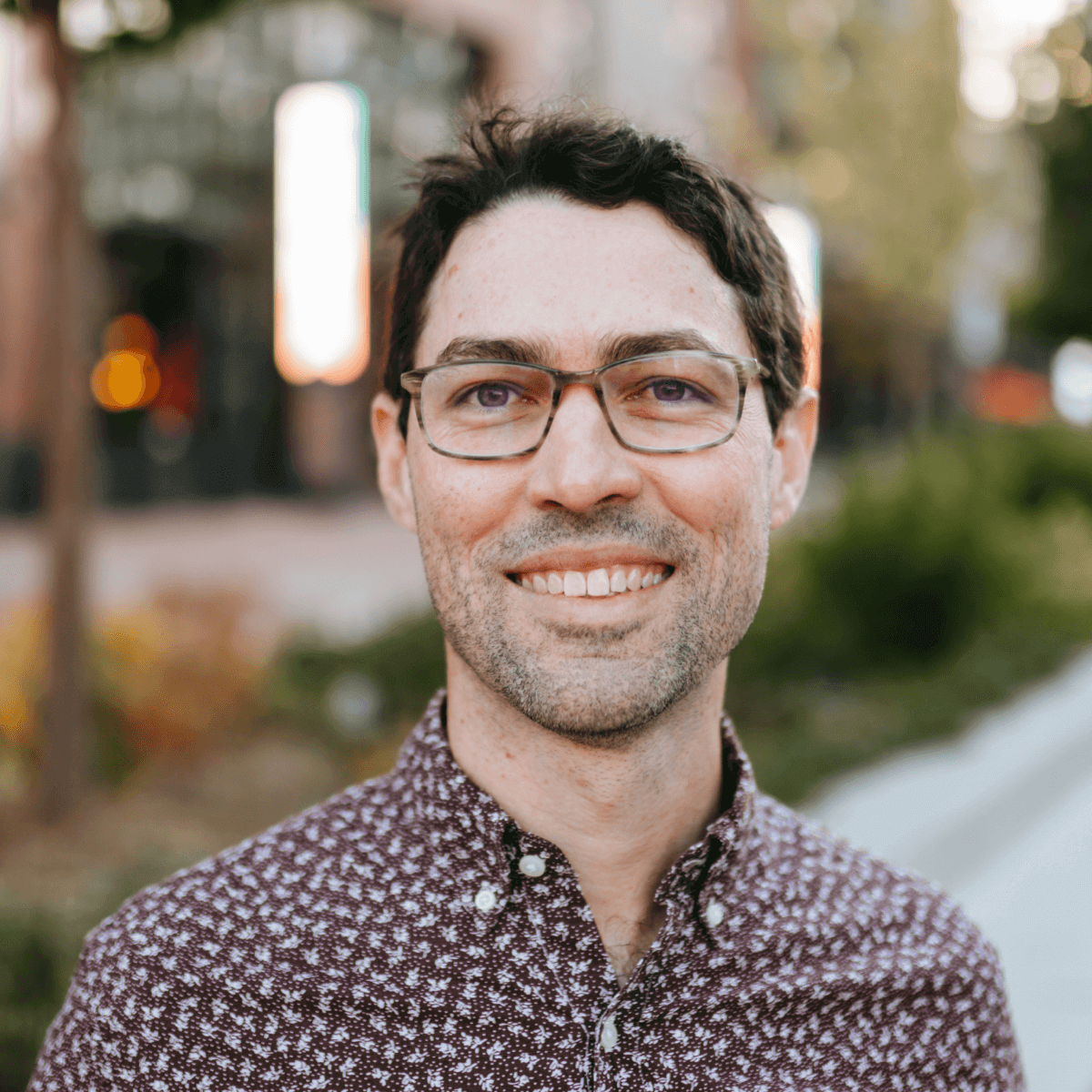 Ray Sylvester
Ray Sylvester
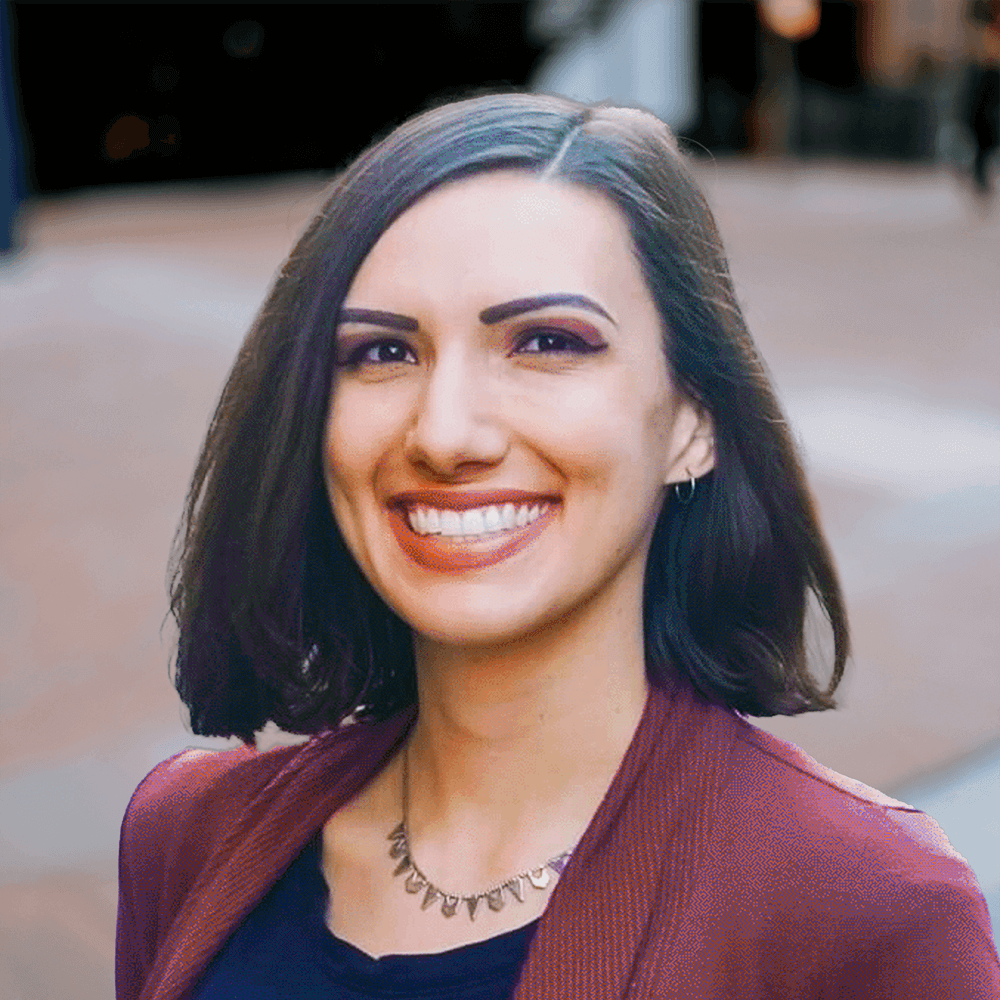 Kelsey Bressie
Kelsey Bressie

